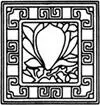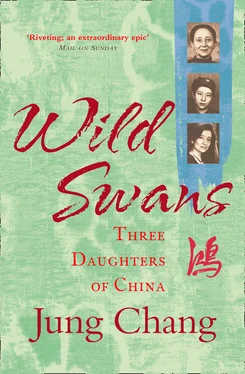
5
‘Daughter for Sale for 10 Kilos of Rice’
In Battle for a New China
1947–1948
Yu-wu had first appeared at the house some months earlier bearing an introduction from a mutual friend. The Xias had just moved from their borrowed residence into a big house inside the walls near the north gate, and had been looking for a rich tenant to help with the rent. Yu-wu arrived wearing the uniform of a Kuomintang officer, accompanied by a woman whom he presented as his wife and a young baby. In fact, the woman was not his wife but his assistant. The baby was hers, and her real husband was somewhere far away in the regular Communist army. Gradually this ‘family’ became a real one. They later had two children together and their original spouses remarried.
Yu-wu had joined the Communist Party in 1938. He had been sent to Jinzhou from the Communists’ wartime headquarters, Yan’an, shortly after the Japanese surrender, and was responsible for collecting and delivering information to the Communist forces outside the city. He operated under the identity of a Kuomintang military bureau chief for one of the districts of Jinzhou, a position the Communists had bought for him. At the time, posts in the Kuomintang, even in the intelligence system, were virtually for sale to the highest bidder. Some people bought posts to protect their families from being forced into the army and from harassment by thugs, others to be able to extort money. Because of its strategic importance, there were a great many officers in Jinzhou, which facilitated the Communist infiltration of the system.
Yu-wu played his part to perfection. He gave a lot of gambling and dinner parties, partly to make connections and partly to weave a protective web around himself. Mingled with the constant comings and goings of Kuomintang officers and intelligence officials was an unending stream of ‘cousins’ and ‘friends’. They were always different people, but nobody asked any questions.
Yu-wu had another layer of cover for these frequent visitors. Dr Xia’s surgery was always open, and Yu-wu’s ‘friends’ could walk in off the street without attracting attention, and then go through the surgery to the inner courtyard. Dr Xia tolerated Yu-wu’s rowdy parties without demur, even though his sect, the Society of Reason, forbade gambling and drinking. My mother was puzzled, but put it down to her stepfather’s tolerant nature. It was only years later when she thought back that she felt certain that Dr Xia had known, or guessed, Yu-wu’s real identity.
When my mother heard that her cousin Hu had been killed by the Kuomintang she approached Yu-wu about working for the Communists. He turned her down, on the grounds that she was too young.
My mother had become quite prominent at her school and she was hoping that the Communists would approach her. They did, but they took their time checking her out. In fact, before leaving for the Communist-controlled area, her friend Shu had told her own Communist contact about my mother, and had introduced him to her as ‘a friend’. One day, this man came to her and told her out of the blue to go on a certain day to a railway tunnel halfway between the Jinzhou south station and the north station. There, he said, a good-looking man in his mid-twenties with a Shanghai accent would contact her. This man, whose name she later discovered was Liang, became her controller.
Her first job was to distribute literature like Mao Zedong’s On Coalition Government , and pamphlets on land reform and other Communist policies. These had to be smuggled into the city, usually hidden in big bundles of sorghum stalks which were to be used for fuel. The pamphlets were then repacked, often rolled up inside big green peppers.
Sometimes Yu-lin’s wife would buy the peppers and keep a lookout in the street when my mother’s associates came to collect the literature. She also helped hide the pamphlets in the ashes of various stoves, heaps of Chinese medicines, or piles of fuel. The students had to read this literature in secret, though left-wing novels could be read more or less openly: among the favourites was Maksim Gorky’s Mother .
One day a copy of one of the pamphlets my mother had been distributing, Mao’s On New Democracy , ended up with a rather absent-minded school friend of hers, who put it in her bag and forgot about it. When she went to the market she opened her bag to get some money and the pamphlet dropped out. Two intelligence men happened to be there and identified it from its flimsy yellow paper. The girl was taken off and interrogated. She died under torture.
Many people had died at the hands of Kuomintang intelligence, and my mother knew that she risked torture if she was caught. This incident, far from daunting her, only made her feel more defiant. Her morale was also boosted enormously by the fact that she now felt herself part of the Communist movement.
Manchuria was the key battleground in the civil war, and what happened in Jinzhou was becoming more and more critical to the outcome of the whole struggle for China. There was no fixed front, in the sense of a single battle line. The Communists held the northern part of Manchuria and much of the countryside; the Kuomintang held the main cities, except for Harbin in the north, plus the seaports and most of the railway lines. By the end of 1947, for the first time, the Communist armies in the area outnumbered those of their opponents; during that year they had put over 300,000 Kuomintang troops out of action. Many peasants were joining the Communist army, or swinging their support behind the Communists. The single most important reason was that the Communists had carried out a land-to-the-tiller reform and the peasants felt that backing them was the way to keep their land.
At the time the Communists controlled much of the area around Jinzhou. Peasants were reluctant to enter the city to sell their produce because they had to go through Kuomintang checkpoints where they were harassed: exorbitant fees were extorted, or they simply had their products confiscated. The grain price in the city was rocketing upwards almost day by day, made worse by the manipulation of greedy merchants and corrupt officials.
When the Kuomintang first arrived, they had issued a new currency known as the ‘Law money’. But they proved unable to control inflation. Dr Xia had always been worried about what would happen to my grandmother and my mother when he died—and he was now nearly eighty. He had been putting his savings into the new money because he had faith in the government. After a time the Law money was replaced by another currency, the Golden Yuan, which soon became worth so little that when my mother wanted to pay her school fees she had to hire a rickshaw to carry the huge pile of notes (to ‘save face’ Chiang Kai-shek refused to print any note bigger than 10,000 yuan). Dr Xia’s entire savings were gone.
The economic situation deteriorated steadily through the winter of 1947–48. Protests against food shortages and price gouging multiplied. Jinzhou was the key supply base for the large Kuomintang armies farther north, and in mid-December 1947 a crowd of 20,000 people raided two well-stocked grain stores.
One trade was prospering: trafficking in young girls for brothels and as slave-servants to rich men. The city was littered with beggars offering their children in exchange for food. For days outside her school my mother saw an emaciated, desperate-looking woman in rags slumped on the frozen ground. Next to her stood a girl of about ten with an expression of numb misery on her face. A stick was poking up out of the back of her collar and on it was a poorly written sign saying ‘Daughter for sale for 10 kilos of rice.’
Читать дальше













